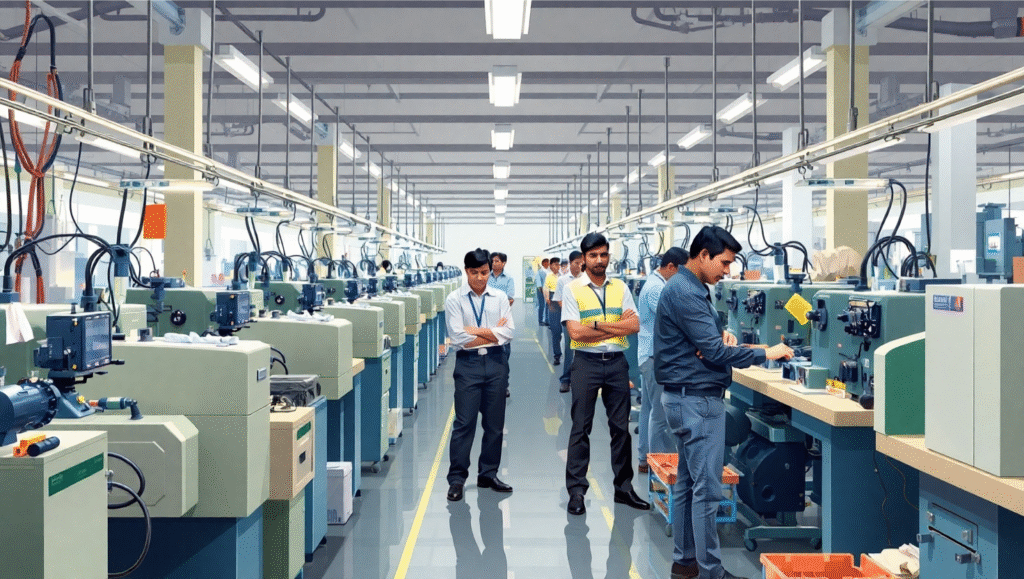Strengthening Productivity through Genuine Formalisation in Manufacturing
Relevance: Economy (UPSC GS III)
Source: The Hindu
Context
A recent study using Annual Survey of Industries (ASI) data (1999–2019) reveals that the share of contract workers in India’s formal manufacturing sector rose from 20% to 40.7%. This increase is largely driven by cost-cutting strategies rather than productivity or skill enhancement, raising concerns over long-term growth and industrial stability.
Core Concern
India’s formal manufacturing is increasingly relying on informal arrangements within formal setups. Contract labour is being used not to improve efficiency or bring in specialized skills, but mainly to reduce labour costs and bypass regulatory obligations. This trend risks long-term productivity and workforce development.
Key Observations from the Study
1. Sharp Rise in Contractualisation
- The share of contract workers in manufacturing rose to 40.7% by 2022–23.
- The trend is observed across sectors, including among large enterprises.
2. Wage Inequality and Exploitation
- Contract workers earn 14.5% less than regular employees on average.
- In large firms, this wage gap is even higher at 31%.
- Overall labour costs for contract workers are 24% lower.
3. Productivity Gap
- Firms heavily dependent on contract workers (CLI firms) show 31% lower productivity than regular labour-intensive (RLI) firms.
- In smaller CLI firms, the gap widens to 42%.
- Only capital-intensive or high-skilled CLI firms show modest productivity gains (5–20%).
4. High Attrition and Lack of Training
- Short-term contracts reduce worker stability and discourage firms from investing in skill training or innovation.
- This leads to a long-term decline in workforce quality and output efficiency.
Structural Challenges
1. Misaligned Contracting Practices
- Third-party contractors are often not invested in firm-level productivity, leading to inefficiencies and principal-agent problems.
2. Declining Work Quality
- Short-term employment weakens worker accountability and quality of output—a case of moral hazard in practice.
3. Evading Labour Laws
- Firms use contract labour to avoid compliance with the Industrial Disputes Act, 1947, denying protections like severance pay and fair grievance handling.
4. Weak Training Incentives
- High worker turnover deters employers from investing in workforce skilling or upgradation.
5. Social Security Deficits
- Many contract workers remain outside the purview of EPF, ESI, and maternity benefits, increasing their vulnerability.
Policy Bottlenecks
1. Delayed Labour Code Implementation
- The Industrial Relations Code, 2020, meant to formalise contract hiring, is pending full implementation at the state level.
2. Risk of Institutionalising Insecurity
- Without safeguards, new codes may legitimise precarious work conditions rather than eliminate them.
3. Labour Union Opposition
- Trade unions are resisting reforms that may reduce collective bargaining power and job security.
4. Early Termination of PMRPY
- The PMRPY scheme, which incentivised formal job creation, ended prematurely without reaching full sectoral coverage.
5. Weak Contract Labour Oversight
- Inspections, especially in MSMEs, are limited—allowing misuse of contract labour to go unchecked.
Policy Recommendations
1. Careful Implementation of Labour Codes
- Fixed-term contracts must include benefits like social security, job protection, and dispute resolution.
2. Encourage Longer Employment Tenures
- Offer incentives like tax relief or procurement preferences for firms adopting longer-term, formal contracts.
3. Revive and Reform PMRPY
- Relaunch with stronger accountability to boost formal employment and reduce dependency on informal hiring.
4. Link Formalisation with Skilling
- Provide subsidised access to skilling schemes (e.g., PMKVY) only to firms with formal employment contracts.
5. Regulate Overuse of Contract Labour
- Penalise excessive reliance on contract labour in low-skill industries through audits or performance-linked penalties.
Conclusion
Cost-based contractualisation in manufacturing undermines productivity, innovation, and job security. To ensure sustained industrial growth, India must shift toward genuine formalisation, skill-based employment, and a stable workforce. A balanced labour policy combining flexibility with worker protection is key to making Indian manufacturing globally competitive.











